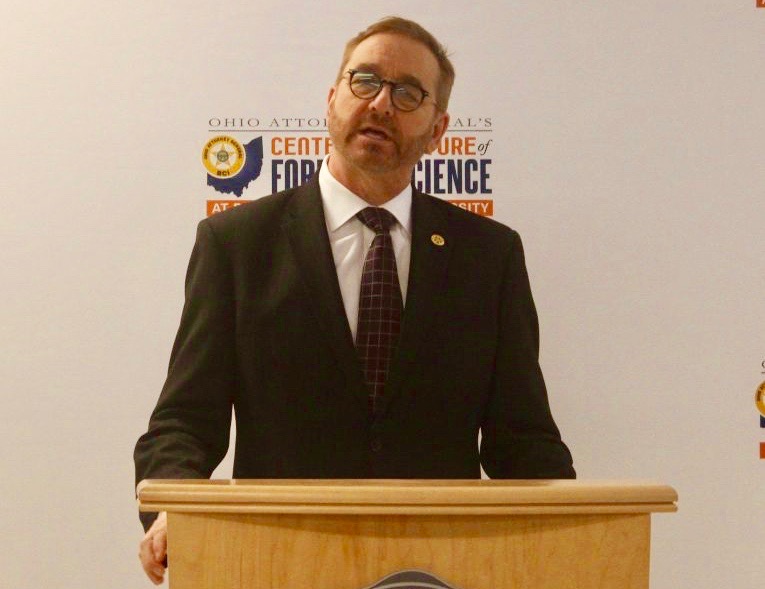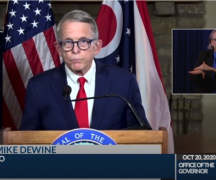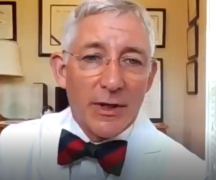Ohio Attorney General Dave Yost last week used an annual report to draw attention to the fact that 140 people are languishing on death row because Ohio’s death penalty machinery “has grown increasingly time consuming, costly and lethargic.”
Yost, a former prosecutor, might be expected to call for ways to speed up executions. But in an interview Monday, he said he’s not doing that.
“I’m saying that (the system is) broken,” he said. “Anytime that you have a law that is not fairly and equally enforced — and promptly enforced — it demeans all law and breeds disrespect for law.”
Ohio has traditionally had a relatively large number of executions, but there haven’t been any in Ohio since July 2018. Since he took office in early 2019, Gov. Mike DeWine has stayed all scheduled deaths, first because a federal judge likened the state’s execution method to torture, and then because the makers of the intravenous drugs have refused to supply them.
So now stays on death row are lengthening.
As part of the attorney general’s 2020 Capital Crimes Report, Yost’s office listed statistics that help describe the average inmate.
That person was 34 years old when sentenced and is 53 now. Of the 56 who made a final walk to the death house since 1981, the average time on death row was 17 years.
Yost said the delays are unacceptable.
As Delaware County Prosecutor, Yost in 2003 handled the case of Gerald “Bobby” Hand, who was convicted of murdering his wife and a friend. Hand, now 72, already had two previous wives who died violent deaths under suspicious circumstances. He is now slated to die in 2023.
Yost said that Hand’s lengthy stay on death row breaks faith with the children of Hand’s victim.
“They were adamant that capital punishment was the appropriate remedy,” he said. “The state of Ohio promised them that if a jury and judge convicted and found that the aggravating circumstances outweighed any mitigation, then that sentence can be imposed. Eighteen years later, the promise is still unfulfilled.”
However, sentiment among Ohioans about the death penalty has been shifting since Hand’s conviction.
In 2014, 68% of Ohioans supported the death penalty, but a poll conducted late last year indicated that the number had almost flipped. Now, 60% support a repeal.
Among the reasons for changing sentiment is that 185 people have been removed from death row in the United States after being exonerated.
And there’s obvious racial bias.
Not only are minorities much more likely than whites to receive the death penalty, they’re much more likely to be exonerated after they do. Of the exonerees, 115 — or 62% — were Black or Latino. Combined, the two groups make up about 32% of the U.S. Population.
Those factors, along with problems finding a way to humanely execute people, might bring permanent change. During the current legislative session, a push to pass a law repealing Ohio’s death penalty appears to have solid, bipartisan support.
Virginia became the 23rd state to do so last month.
Yost said he doesn’t have a stance on repeal, but if it’s going to happen, it should happen quickly, he said. Conversely, if the death penalty is to remain, Yost wants the process sped up.
“The question of whether to have capital punishment is a question that is up to the legislature and, within the limits of a veto, to the governor,” he said. “But what we have right now is a law on the books that is not enforced, which is the worst of all possible worlds.”
***
Also from Ohio Capital Journal:
How a powerful state law blocks Ohio cities from gun regulation
The Ohio Supreme Court declined Wednesday to review an appellate court’s decision, letting stand a ruling that the city of Cincinnati cannot ban “bump stocks” on assault weapons.
Cincinnati tried to ban use of the mechanical attachments, designed to increase rifles’ rates of fire, in 2018 after a shooter used one during a 2017 massacre in Las Vegas that left 58 dead.
The city has no legal right to set its own gun laws, appellate judges ruled.
The final outcome, announced last week, is just the latest instance of Ohio courts ruling that cities cannot enact end-runs around a state legislature regularly seeking to expand gun rights. READ MORE
Bill seeks to end ‘dark money’ spending in Ohio elections
Republican lawmakers are proposing to revamp some of Ohio’s campaign finance laws that would shine a light on “dark money” groups.
Public officials from both parties have called for reforms in the wake of the House Bill 6 scandal, which saw the speaker of the Ohio House arrested as well as widespread attention paid to how certain groups navigate campaign finance and tax laws to anonymously influence Ohio election results.
HB 13, introduced by GOP state Reps. Diane Grendell of Chesterland and Mark Fraizer of Newark, is the latest attempt at ensuring better transparency in political spending. The bill differs from an earlier effort from last fall in that it does not yet have bipartisan support. READ MORE
Judge blocks Ohio’s abortion disposal law
A Hamilton County judge has blocked an Ohio law regulating disposal of surgical abortion tissue that was set to take effect Tuesday.
Hamilton County Common Pleas Court Judge Alison Hatheway granted a preliminary injunction Tuesday pausing the enactment of the law temporarily. The judge said because the state has not created forms, rules and regulations needed for clinics to follow the law, it can’t be put in effect quite yet.
“Without the required rules and forms in place, plaintiffs will be forced to stop providing procedural abortions because of the real threat of severe sanctions and penalties independent from criminal prosecution,” Hatheway said in court on Tuesday.
An attorney for the Ohio Department of Health said the rules would be put in place with an “emergency rule exception.”
“The most I can say is that my client’s telling me it will be done on an emergency basis in the near future,” said attorney Andrew McCartney. READ MORE
HELP OHIO CAPITAL JOURNAL GROW Make a tax-deductible donation.





